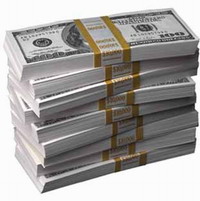US dollar balances between euro and pound
The dollar went down against the euro and the yen Monday.

The 13-nation euro bought $1.4667 in late New York trading, slightly above its level of $1.4659 Friday.
The dollar also declined against the Japanese currency, falling to 109.85 yen from 110.82 yen late Friday.
But the dollar edged up against the pound, as the British currency slipped to $2.0497 Monday from $2.0515. The dollars also rose to 98.31 Canadian cents from 97.48 cents last Friday.
This week's Thanksgiving break in the United States, along with a three-day weekend in Japan, led to thin trading.
Goldman Sachs downgraded large banks and estimated Citigroup Inc. would have to write down $15 billion (10.24 billion EUR) due to its exposure to risky debt over the next two quarters. Investors fear the housing market may finally prove a drag on consumer spending, which has buoyed the U.S. economy during the persistent mortgage crisis.
The National Association of Homebuilders' housing forecast for November was the same as October's revised figure.
Washington is due Tuesday to release data on housing starts and building permits, followed by jobless claims on Wednesday, which could give the currency markets more direction.
The dollar has suffered against the euro recently from speculation that the U.S. Federal Reserve will continue cutting interest rates even as the European Central Bank holds, or even increases, its rates.
At a meeting of central bankers in South Africa on Monday, ECB President Jean-Claude Trichet repeated that "disorderly" exchange rate moves do not favor global growth.
"It's clear that all of us consider excessive volatility and abrupt movements as undesirable for economic growth," Trichet said. However, he noted that no specific currency or country was singled out in the central bankers' discussions.
In other New York trading, the dollar fell to 1.1159 Swiss francs Monday from 1.1182 Swiss francs.
Subscribe to Pravda.Ru Telegram channel, Facebook, RSS!





